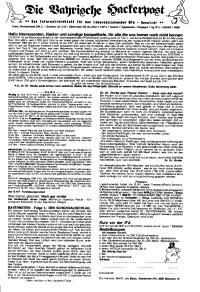Copy Link
Add to Bookmark
Report
Atari Online News, Etc. Volume 16 Issue 33

Volume 16, Issue 33 Atari Online News, Etc. August 15, 2014
Published and Copyright (c) 1999 - 2014
All Rights Reserved
Atari Online News, Etc.
A-ONE Online Magazine
Dana P. Jacobson, Publisher/Managing Editor
Joseph Mirando, Managing Editor
Rob Mahlert, Associate Editor
Atari Online News, Etc. Staff
Dana P. Jacobson -- Editor
Joe Mirando -- "People Are Talking"
Michael Burkley -- "Unabashed Atariophile"
Albert Dayes -- "CC: Classic Chips"
Rob Mahlert -- Web site
Thomas J. Andrews -- "Keeper of the Flame"
With Contributions by:
Fred Horvat
To subscribe to A-ONE, change e-mail addresses, or unsubscribe,
log on to our website at: www.atarinews.org
and click on "Subscriptions".
OR subscribe to A-ONE by sending a message to: dpj@atarinews.org
and your address will be added to the distribution list.
To unsubscribe from A-ONE, send the following: Unsubscribe A-ONE
Please make sure that you include the same address that you used to
subscribe from.
To download A-ONE, set your browser bookmarks to one of the
following sites:
http://people.delphiforums.com/dpj/a-one.htm
Now available:
http://www.atarinews.org
Visit the Atari Advantage Forum on Delphi!
http://forums.delphiforums.com/atari/
=~=~=~=
A-ONE #1633 08/15/14
~ NSA Eyed Preset Strikes! ~ People Are Talking! ~ Reclassify Providers!
~ Call of Duty Multiplayer ~ Gamescom To Set Record ~ 3 New Xbox Bundles!
~ "BadUSB" Exploit Evil! ~ More Facebook Concerns ~ Pop-up Ads Apology!
~ Mother & Son Fire Video! ~ Password Manager Sites ~ Share Games on PS4!
-* Chinn on Upcoming Atari Film *-
-* Net Neutrality Should Be Debated More *-
-* Apple Stores Users' Personal Data in China *-
=~=~=~=
->From the Editor's Keyboard "Saying it like it is!"
""""""""""""""""""""""""""
Another week, more sagas - but I'll skip past all that in order to get
this week's issue out in a fairly timely fashion. Afterall, there's
only so much time to vent frustration; and I have little this week.
Typical.
Until next time...
=~=~=~=
->In This Week's Gaming Section - Three New Xbox Bundles!
""""""""""""""""""""""""""""" Why PS4 Will Let Players Share Games!
'Call Of Duty: Advanced Warfare'!
And much more!
=~=~=~=
->A-ONE's Game Console Industry News - The Latest Gaming News!
""""""""""""""""""""""""""""""""""
Three New Xbox Bundles, Pre-loading Feature Announced at Gamescom
A trio of new retail bundles annouced for Xbox One will feature soccer
game "FIFA 15," sci-fi shooter "Call of Duty: Advanced Warfare" and
oddball zombie action title "Sunset Overdrive."
Speaking as part of the Xbox Media Briefing in Cologne, Germany, prior to
the opening of video game convention Gamescom, Microsoft representatives
introduced three new console bundles designed to make it easier for
consumers to choose an Xbox One this holiday season.
Both "Call of Duty: Advanced Warfare" and "FIFA 15," though available on
a multitude of consoles as well as on PC, will include exclusive hooks
for Xbox owners: first admission to the optional expansions of "COD: AW,"
and the returning FIFA Ultimate Team Legends mode, itself a fork of the
sports game's more widely available Ultimate Team player collection
spin-off.
By contrast, "Sunset Overdrive" is entirely exclusive to Xbox One,
developed by long-time PlayStation contractor Insomniac Games
("Ratchet & Clank," "Resistance" franchises).
The vibrant, irreverent post-apocalyptic action game invites players to
have a whale of a time while they're surviving a zombie onslaught caused
by contaminated fizzy pop.
With the "FIFA 15" bundle limited to European (read: football mad)
territories, both it and the white Xbox One of the internationally
available "Sunset Overdrive" package are to retail for $399 / 399 /
£349, while the "Call of Duty" themed bundle, with its custom colored
console and controller and cavernous 1TB hard drive, will go for $499 /
499 / £429.
Closing the conference, Head of Xbox Phil Spencer revealed that "FIFA 15"
and "Call of Duty: Advanced Warfare" would be the first Xbox One titles
to allow both pre-order and pre-load via Xbox Live, a feature that has
already made its way onto PC and PS4; the mechanism allows players to get
going as soon as release day hits, having already completed the hefty
game data download.
Why PS4 Will Let Players Share Games Without Swapping Or BuyingDiscs
A panic among gamers was set off last year by rumors that the new consoles
from Sony and Microsoft would keep anyone but the original buyer of a game
from playing it. At risk was the time-honored tradition of swapping discs
among friends, not mention the sprawling market for used games. The
feared second-hand game restrictions didnt come to pass, and in the
months since, Sony has been developing an increasing number of ways to
play games without forking over $60 for a disc of your own.
A newly announced update to the PlayStation 4 software will allow players
to join in a friends game online, even if the person joining doesnt
have a copy of the game. The idea, called Share Play, is basically a
virtual version of inviting someone over to sit next to you on the couch.
Share Play will be available in the fall. Sony also recently launched
Playstation Now, a streaming service that allows people to rent games for
far less than the retail price. Electronic Arts (EA), meanwhile, has its
own streaming service for XBox One that gives gamers access to a range
of titles for a monthly fee.
After hearing a lot about the anticipated death of console gaming in
recent years, the industry is clearly trying to be flexible about how
games can be purchased and played. That demise hasnt seemed quite as
imminent lately. Sony said Tuesday it has sold 10 million PS4 consoles,
easily beating the pace for its last generation of consoles. Microsoft
also had a press event Tuesday but didnt mention anything about sales,
so its safe to assume that Sony remains comfortably ahead.
The business models for new forms of console gaming, however, could get
tricky. No matter the type of media, streaming services make content
creators nervous, because such services dull the incentive to keep buying
media through traditional methods. In theory, such features as PS4's
Share Play could further discourage people to buy as many games.
Sonys not worried. It says that virtually any game that works on PS4 will
be available for Share Play, with the exception of games that require the
use of peripheral devices, such as a camera. At the moment, the company
sees the feature purely as a way to help get gamers excited about games
they dont own, says John Koller, Playstations head of marketing. Sony
is just leaving its options open for different business models in the
future.
Game developers will also have the option to write code that keeps the
feature from working, but Koller says he doesnt know of any who plan to
do so. He predicts developers wont see Share Play as any more
threatening than old-fashioned disc sharing. There is a sensitivity to
sharing discs, because you can complete the game that way, he says.
This way, you get a taste. To get the full meal you have to buy the
game.
David Edery, the chief executive of Spry Fox, whose game Road Not Taken
was recently released for PS4, said hes excited for Share Play, mostly
because it mimics the way he played games as a kid. Sony has a vested
interest in making sure games keep selling, he says. Bear in mind that
the Playstation division generates nearly all its profit from games, not
hardware.
Games Fair To See Record Visitors on Microsoft, Sony Ware
The worlds largest video-game fair is set to draw a record attendance
this week as visitors seek out titles for new consoles from Microsoft
Corp. and Sony Corp.
Gamescom, which starts today in Cologne, Germany, is expected to draw
more visitors than last years 340,000, organizers say. For the event,
Sony tapped veteran game developer Hideo Kojima to promote the latest
installment of Metal Gear Solid, one of the best-selling series in
history, for its PlayStation 4.
Microsoft is showing footage of Quantum Break, an Xbox One-exclusive
action adventure. Among games publishers, Ubisoft Entertainment will
compete with Activision Blizzard Inc. and Electronic Arts Inc. in getting
a head start into the holiday season and benefit from surging sales of
the latest machines.
Story: A Shortcut to Cure Big Data Headaches
The next-generation consoles are selling better than expected, but there
is a dearth of games tailored to what theyre capable of, Todd Mitchell,
an analyst at Brean Capital LLC in New York, said in a phone interview.
Were finally looking at a much more robust lineup for the fall, and
there will start to be winners and losers.
Unlike the Electronic Entertainment Expo in Los Angeles, Gamescom, which
has been held since 2009, is open to the public on four out of five days,
making it more important to create resonance on social media such as
Twitter Inc. and Facebook Inc.
To win new customers, games makers are trying out new business models,
such as the sort of monthly subscriptions used by Netflix Inc., instead
of the traditional pay-per-game model. At the same time, they need to
keep an eye on smaller publishers winning users over with free-to-play
games that generate revenue through payments for in-game content such as
upgrades to weapons.
Sonys new console has sold 10 million units worldwide, the Tokyo-based
company said at a news conference yesterday. The machine has been
leading Microsofts Xbox One since the two devices started selling in
late 2013. Thats prompted Microsoft to offer its console unbundled from
the Kinect motion-sensing device to lower its sales price.
Well be there in a big way, Alan Lewis, vice president of corporate
communications at Take-Two Interactive Software Inc., said in a
telephone interview.
The New York-based company will be letting users play planned releases,
including NBA 2K15 and WWE 2K15 that will be on sale in October for
new-generation consoles and PCs. Professional wrestler Big Show will
appear on behalf of the company, to deliver a special announcement
about WWE 2K15, Lewis said.
Electronic Arts, the largest maker of games for the Xbox One and PS4,
will present playable versions of its sports titles FIFA 15 and NHL 15,
and will also show role-playing game Dragon Age Inquisition along with
mobile titles, Chief Operating Officer Peter Moore said in an interview.
'Call Of Duty: Advanced Warfare' Multiplayer Revealed
Call of Duty: Advanced Warfare promises big changes to Activisions
yearly franchise, and nowhere is this more apparent than the games
multiplayer mode.
The new exoskeleton adds numerous new movement options, including boost
jump, dodge, slide, and slam. The first truly futuristic Call of Duty
promises more verticality in map design, reminiscent of Respawns recent
Titanfall shooter with its mechs and double-jumping pilots, though
developer Sledgehammer was developing its game at the same time as
Respawn.
Multiplayer also expands on customization options, with Activision
promising nearly 350 custom weapons, over 1,000 in-game player rewards,
and over 2 billion unique player combinations. Im not sure if thats
overboard, but at least we have choices.
With Call of Duty: Advanced Warfare we introduced the first new lead
developer to the franchise in a decade and our first three-year
development cycle, with one mission: bring breakthrough innovation to the
franchise, while also honoring its roots. We feel Sledgehammer Games has
risen to that challenge, Activision Publishing, Inc.s CEO, Eric
Hirshberg said in a statement. Advanced Warfare introduces significant
new mechanics to multiplayer that truly changes the game, but more
importantly just speaking as a gamer its a hell of a lot of fun.
Other changes include the evolution of the Pick 10 system upping this to
Pick 13; co-op scorestreaks; and a new energy class of weapons. These
futuristic weapons use heat management rather than ammo, though
Sledgehammer has gone to great lengths to make sure that even the
science fiction elements of Advanced Warfare are plausible. , from
weapons to the exoskeletons.
Players will also be able to test out their arsenal in a new virtual
shooting range, and a Virtual Lobby to show off your custom characters
and rewards.
Character customization itself has been overhauled pretty radically,
allowing gamers to use the new Create-an-Operator system to customize a
wide array of items from shirts to glasses to the exoskeleton itself.
Sledgehammer has also introduced Supply Drops which drop random in-game
items including weapons and other gear and fall more frequently the more
you play.
New game modes such as Uplinka sort of rugby-esque twist on capture the
flag involving a satellite droneand Momentum have also been added.
All told there are a lot of big changes coming to Advanced Warfares
multiplayer (and single player) mode, quite possibly the biggest suite of
changes and innovations since Modern Warfare. This is both exciting for
those of us whove been asking for more innovation and a bit of a risk
for Activision and Sledgehammer.
Call of Duty is still the top dog, and I think bringing innovation to
the table is the only way to stay number one. On the other hand, the old
maxim If it aint broke, dont fix it also applies. And Call of Duty
fans have not always responded positively to attempts at change.
Still, its exciting to see the video game industrys biggest franchise
offer up some new and much-needed twists. Better to take risks than to
slumber in mediocrity.
PSP Ends Shipments in Japan
Sony Computer Entertainment Japan announced on Monday that it will cease
production of new Japanese PlayStation Portable (PSP) units in June. A
little under ten years have passed since the portable video game system
debuted in Japan.
The company's Sony Store began a campaign on Tuesday titled Summer 2014
Super Coaxing Strategy! which will allow PSP-3000 owners to turn in
their old PSP system and get 3,000 yen (about US$30) off the purchase of
a PlayStation Vita system. In addition, PSP-2000 and PSP go owners will
get an 1,000 yen (about US$10) discount. Students will get an increased
discount of 1,000 yen more off.
Sony released its first portable game system in Japan on December 12,
2004. As of January 2013, the system has sold 19.26 million units in
Japan, and has sold 69 million units worldwide. Multiple titles are
scheduled for release for the system later this year, including two
QuinRose titles. Otomate's Urakata Hakuoki: Akatsuki no Shirabe PSP
game is scheduled to ship on August 7.
=~=~=~=
->A-ONE Gaming Online - Online Users Growl & Purr!
"""""""""""""""""""
Documentary Director Chinn on Upcoming Atari Film
Video games have gone Hollywood, but a new documentary recalls those
early, halcyon days when a technology startup called Atari first brought
the arcade experience into the living room more than three decades ago.
Many fans and serious gamers may not know the back story of how it all
began, boomed, and crashed-before many of them were born-or that some of
the biggest stars in Silicon Valley had humble beginnings creating code
and cartridges for Atari.
Then theres the unearthing last year of thousands of E.T. game
cartridgeswidely considered one of the worst games ever- in a New Mexico
landfill. The games were unceremoniously buried under cover of darkness,
providing enough intrigue to ensnare a pair of multiple-award winning
documentarians wanting to tell that tale as well.
Emmy winning producer Jonathan Chinn and his cousin, double-Oscar winner
Simon Chinn, and their LIGHTBOX media company are the driving force
behind the documentary series and its first film: Atari: Game Over.
The doc will premiere in fall and will be distributed by Microsoft via
its Xbox game console; apropos since the software giant embodies the
growth and symbiotic relationship between video gaming and the tech
revolution.
In an exclusive interview with FOX Business, Jonathan Chinn shared his
view on how Atari changed his life, and likely yours, forever and
deserves its place as tech revolutionary rabble-rouser
What drew you to the Atari story?
It was the first entertainment-based Silicon Valley company, and theres
the epic fail (of Atari) and video game crash. It struck us as we hit
upon something that would allow us to look at a moment in time through
an intriguing, slightly controversial story.
This series (of documentary films) is about seminal and slightly
underexposed moments in the digital revolution. When the story came to
our attention, I think our first instinct was to think it was a bit of a
niche story appealing to gamers. We want the series as a whole to appeal
to a broader audience.
While the burial of ET cartridges may not stack up against the
formation of Apple or Facebook in seminal moments of the digital
revolution
I think Atari has a place in that evolution. They dont
exist today, yet they were there before everybody else. Steve Jobs
worked there, Steve Wozniak worked there. You can trace back the
dot-com boom and philosophy, Atari started all of that, the
pot-smoking, geek chic revolution.
(Chinn takes a dramatic pause) The short answer, it was just a really
damn good story. Ultimately were interested in good stories.
Did you have an Atari 2600 video game console?
I absolutely had the first generation Atari 2600. I remember the day my
father brought it back to the house on a weekend. It was probably the
most exciting moment in my life at that point. That was another
contributing factor to produce the film. Im not a gamer, I havent
identified with the hard-core gaming community, but I was a gamer back
then. I remember the liberation of having an entertainment system in my
house.
My relationship with the digital revolution could be traced back to
then. We had it before our first PC.
Have video games truly crossed into mainstream America?
I recently got an Xbox and havent played a game since the 2600. Its
changed an enormous amount
Technology is making video games feel in some
ways more like movies. Its a renaissance, the interest in Atari and
our film show(s) renewed interest and respect for the video game creator
as an artist. The existing boundaries between art and gaming, or film
and gaming are getting broken down. The big show runners, filmmakers,
all play games: Joss Whedon, J.J Abrams
theyre coming out of the
digital closet.
Were you surprised that Microsofts Xbox hired LIGHTBOX to produce
documentaries?
Were living in digital world. The revolutionary part has happened.
Its time to do a series that asks the question: How did we get here?
And, What does it mean for where were heading?
We thought about who would be interested, and we felt strongly it should
be a company thats part of that (tech revolution)- Amazon.com, Netflix),
Hulu, and until recently, Xbox (Microsoft has essentially shut down its
Xbox Entertainment Studios as part of recent, sweeping job cuts), we
felt it was a great fit.
How many docs will you produce for Xbox?
I cant answer that, with the closure of Xbox Studios, its uncertain.
We have two films including Atari that are close to being done.
The other film is a very different story. Greg Barker (who directed the
Manhunt HBO documentary on the hunt for Usama bin Laden) is making a
film about the role of citizen journalism in the hours and days after
the Boston Bombings. Its about Reddit and the rush to judgment and the
digital and social media witch hunt that went on, mostly for wrong
people. It celebrates citizen journalism and asks: Should there be
boundaries for journalism so things like this wont happen? Theres no
release date-sometime in the next four to six months.
=~=~=~=
A-ONE's Headline News
The Latest in Computer Technology News
Compiled by: Dana P. Jacobson
FCC Commissioner In Columbus Says Net Neutrality Should Be Fully Debated
The Federal Communications Commission is preparing to collect public
comment on a controversial proposal to create what many call a web
superhighway.
"My own view is that the FCC should prioritize polices that make
broadband available to everybody," said FCC commissioner Ajit Pai.
"That includes rich and poor, urban and rural. If we do that I'm sure
the net neutrality concerns will evaporate."
Pai will be just one of just five commissioners voting on the issue. He
sat down with 10TV today and said his agency has so far received more
than one million comments on the web issue.
And it's not over yet.
"Whatever regulations the FCC adopts it's important to remember it's
going to be embroiled in litigation for potentially years," said Pai.
Many web users are adamantly opposed to the idea.
"I think it's a very dangerous precedent," said social media expert
Kelley Bell. "Imagine roads and only the big companies can use the
freeways and the rest of us drive in the ally's and nobody is fixing the
potholes. That's what people are afraid of."
So afraid that earlier this year hundreds of protesters rallied outside
the Federal Communication Commission in Washington.
"This is the first time in the history of the world that the people have
had equal access to information," said Bell. "And the ability to speak
and be heard. We have to protect that."
The FCC proposal sparked a lot of criticism for allowing providers like
AT&T and Verizon to charge companies for a superhighway.
The agency is now in the middle of a 90 day review.
Bell says that's why many web users want the FCC to slow down and take a
lot of public comment. "The internet moves at the speed of light," said
Bell. "But our lawmaking in regards to it needs to take its time."
Reclassify Internet Providers for 'Net Neutrality'
US regulators' new "net neutrality" rules should classify internet
providers more like public utilities to prevent them from potentially
slowing users' access to some web content, the New York Times said in an
editorial.
The statement comes as the Federal Communications Commission (FCC) is
preparing to set the new rules, which would regulate how internet service
providers, or ISPs, manage traffic on their networks. In January, a
federal court struck down the agency's previous version of those rules.
The FCC is now collecting public comment on the rules it tentatively
proposed in May, which the New York Times called troubling.
While prohibiting ISPs from blocking any content, the proposal suggested
allowing some "commercially reasonable" deals where content companies,
such as Netflix Inc or Amazon.com Inc, could pay ISPs, such as Comcast
Corp or Verizon Communications Inc, to ensure smooth and fast delivery of
their web traffic.
Although FCC Chairman Tom Wheeler has insisted the agency would carefully
guard against abuse of the rules, the proposal drew ire from public
interest groups and large Web companies. They say it would result in
faster download speeds for some content as other data would be relegated
to "slow lanes."
Consumer advocates have called on the FCC to instead reclassify ISPs as
telecommunications services rather than as the less-regulated information
services they are now, saying the move would give more power to the FCC
to stop potential violators of net neutrality.
The New York Times has now joined their ranks, pointing to President
Barack Obama's recent comments at a recent conference with African
leaders in Washington, where he said an equally accessible Internet is
important for "the next Google or the next Facebook."
The New York Times editorial said, "Small and young businesses will not
be able to compete against established companies if they have to pay fees
to telephone and cable companies to get content to users in a timely
manner."
A better option, the paper said, would be for the FCC to reclassify
broadband Internet service as a telecommunications service, which would
allow the regulators to prohibit ISPs from "engaging in unjust or
unreasonable discrimination against content."
Experts have disagreed on whether or how reclassification would
adequately prevent pay-for-priority deals.
ISPs and Republicans, both in Congress and at the FCC, strongly oppose
reclassification, saying a heavier regulatory burden may hurt investment
in broadband networks.
The ISPs also say they support an open internet and having some content
in "slow lanes" would upset their customers and so is not in their
interest.
Wheeler has not proposed reclassification as the solution, but has not
taken it off the table as a potential route.
NSA Eyed Preset Strikes in Cyberattacks
The National Security Agency secretly planned a cyberwarfare program that
could automatically fire back at cyberattacks from foreign countries
without any human involvement, creating the risk of accidentally starting
a war, according to a new report based on interviews with former NSA
contractor Edward Snowden.
The program, codenamed MonsterMind, would have let the military agency
automate the process of "hunting for the beginnings" of a foreign
cyberattack, the report said. The software would be constantly on the
lookout for digital "traffic patterns" that indicated known or suspected
attacks, the report published this week by Wired magazine said.
The report, part of a wide-ranging interview with Snowden in Moscow,
described the MonsterMind program as "in the works" and went further than
other programs that existed for decades. Without any human involvement,
Snowden told the magazine, a counter-attack could be leveled at an
innocent party largely because initial attacks are often routed or
diverted through other countries.
"You could have someone sitting in China, for example, making it appear
that one of these attacks is originating in Russia. And then we end up
shooting back at a Russian hospital," Snowden said. "What happens next?"
The problem of attribution after a cyberattack has long unsettled
computer security experts. A House technology subcommittee in 2010
concluded that, "proactively tracing interactions within a system may
help determine where an attack originated after one occurs, but tracing
every interaction is impractical and quite likely unconstitutional."
Snowden also called the program a major threat to privacy because NSA
would first "have to secretly get access to virtually all private
communications coming in from overseas to people in the U.S.," said the
new report, by NSA expert and author James Bamford.
Snowden remains exiled in Russia since leaking top secret NSA documents
to journalists last year. They revealed the NSA was collecting the phone
records and digital communications of millions of citizens not suspected
of a crime, prompting congressional reform.
The NSA declined to comment on specifics of the Wired report. A
spokeswoman, Vanee Vines, instead said: "If Mr. Snowden wants to discuss
his activities, that conversation should be held with the U.S. Department
of Justice. He needs to return to the United States to face the charges
against him."
Snowden is charged under the U.S. Espionage Act and faces up to 30 years
in prison for leaking the documents.
The U.S. government has elevated lately the damages of foreign
cyberattacks against American interests. In May, the Justice Department
brought first-of-its kind cyber-espionage charges against five Chinese
military officials accused of hacking into U.S. companies to gain trade
secrets.
Snowden also told the magazine that the NSA tried to hack into a major
Syrian Internet router in 2012 during the middle of the country's civil
war. But he said the NSA mistakenly "bricked" the router computer-speak
for rendering it useless temporarily crippling Internet access there.
Apple Begins Storing Users' Personal Data on Servers in China
Apple Inc has begun keeping the personal data of some Chinese users on
servers in mainland China, marking the first time the tech giant is
storing user data on Chinese soil.
The storage of user data in China represents a departure from the
policies of some technology companies, notably Google Inc , which has
long refused to build data centers in China due to censorship and privacy
concerns.
Apple said the move was part of an effort to improve the speed and
reliability of its iCloud service, which lets users store pictures,
e-mail and other data. Positioning data centers as close to customers as
possible means faster service.
The data will be kept on servers provided by China Telecom Corp Ltd, the
country's third-largest wireless carrier, Apple said in a statement on
Friday.
"Apple takes user security and privacy very seriously," it said. "We have
added China Telecom to our list of data center providers to increase
bandwidth and improve performance for our customers in mainland china.
All data stored with our providers is encrypted. China Telecom does not
have access to the content."
A source with knowledge of the situation said the encryption keys for
Apple's data on China Telecom servers would be stored offshore and not
made available to China Telecom.
Apple has said it has devised encryption systems for services such as
iMessage that even Apple itself cannot unlock. But some experts expressed
scepticism that Apple would be able to withhold user data in the event of
a government request.
"If they're making out that the data is protected and secure that's a
little disingenuous because if they want to operate a business here,
that'd have to comply with demands from the authorities," said Jeremy
Goldkorn, director of Danwei.com, a research firm focused on Chinese
media, internet and consumers.
"On the other hand if they don't store Chinese user data on a Chinese
server they're basically risking a crackdown from the authorities."
Goldkorn added that data stored in the United States is subject to similar
U.S. regulations where the government can use court orders to demand
private data.
A spokesman for China Telecom declined to comment.
With its rising middle class, China has become an increasingly important
market for Apple. Sales of the iPhone rose almost 50 percent in China in
the three months ended June and salvaged an otherwise lackluster quarter
for the Cupertino company.
Other companies have opted not to situate servers in China, where they
would have to comply with local laws.
Google publicly abandoned China in 2010 and moved its services, including
its search engine, to Hong Kong-based servers after refusing to comply
with Chinese government censorship. Microsoft Corp also does not have
servers for its email service in China.
Yahoo Inc came under criticism in 2005 after it handed to Chinese
authorities emails that led to the imprisonment of Shi Tao, a journalist
who obtained and leaked an internal censorship order the government had
sent Chinese media.
"China doesn't want any digital service offered to Chinese people to be
hosted offshore," said Goldkorn. "I suppose it was inevitable that Apple
had to comply if they were using foreign servers for Chinese user data."
In July, Apple's iPhone was branded a danger to China's national security
by state media, because of the smartphone's ability to track and
time-stamp user locations. Apple denied tracking user locations.
Apple has frequently come under fire from Chinese state media, which
accused the company of providing user data to U.S. intelligence agencies
and have called for 'severe punishment'.
The U.S. company has strongly denied working with any government agencies
to create back doors into its products or servers. "We have also never
allowed access to our servers. And we never will," Apple has previously
stated.
News of the China Telecom deal emerged Thursday after a local government
website in the southeastern province of Fujian announced that iCloud had
migrated to China Telecom's servers after 15 months of rigorous testing
and review. The website article is no longer available on the site.
This Thumbdrive Hacks Computers. BadUSB Exploit Makes Devices Turn Evil
When creators of the state-sponsored Stuxnet worm used a USB stick to
infect air-gapped computers inside Iran's heavily fortified Natanz
nuclear facility, trust in the ubiquitous storage medium suffered a
devastating blow. Now, white-hat hackers have devised a feat even more
seminalan exploit that transforms keyboards, Web cams, and other types
of USB-connected devices into highly programmable attack platforms that
can't be detected by today's defenses.
Dubbed BadUSB, the hack reprograms embedded firmware to give USB devices
new, covert capabilities. In a demonstration scheduled at next week's
Black Hat security conference in Las Vegas, a USB drive, for instance,
will take on the ability to act as a keyboard that surreptitiously types
malicious commands into attached computers. A different drive will
similarly be reprogrammed to act as a network card that causes connected
computers to connect to malicious sites impersonating Google, Facebook
or other trusted destinations. The presenters will demonstrate similar
hacks that work against Android phones when attached to targeted
computers. They say their technique will work on Web cams, keyboards,
and most other types of USB-enabled devices.
"If you put anything into your USB [slot], it extends a lot of trust,"
Karsten Nohl, chief scientist at Security Research Labs in Berlin, told
Ars. "Whatever it is, there could always be some code running in that
device that runs maliciously. Every time anybody connects a USB device to
your computer, you fully trust them with your computer. It's the
equivalent of [saying] 'here's my computer; I'm going to walk away for
10 minutes. Please don't do anything evil."
In many respects, the BadUSB hack is more pernicious than simply loading
a USB stick with the kind of self-propagating malware used in the Stuxnet
attack. For one thing, although the Black Hat demos feature only USB2 and
USB3 sticks, BadUSB theoretically works on any type of USB device. And
for another, it's almost impossible to detect a tampered device without
employing advanced forensic methods, such as physically disassembling
and reverse engineering the device.
Antivirus scans will turn up empty. Most analysis short of sophisticated
techniques rely on the firmware itself, and that can't be trusted.
"There's no way to get the firmware without the help of the firmware, and
if you ask the infected firmware, it will just lie to you," Nohl
explained.
Most troubling of all, BadUSB-corrupted devices are much harder to
disinfect. Reformatting an infected USB stick, for example, will do
nothing to remove the malicious programming. Because the tampering
resides in the firmware, the malware can be eliminated only by replacing
the booby-trapped device software with the original firmware. Given the
possibility that traditional computer malware could be programmed to use
BadUSB techniques to infect any attached devices, the attack could
change the entire regimen currently used to respond to computer
compromises.
"The next time you have a virus on your computer, you pretty much have to
assume your peripherals are infected, and computers of other people who
connected to those peripherals are infected," Nohl said. He said the
attack is similar to boot sector infections affecting hard drives and
removable storage. A key difference, however, is that most boot sector
compromises can be detected by antivirus scans. BadUSB infections can
not.
The Black Hat presentation, titled BadUSBon accessories that turn evil,
is slated to provide four demonstrations, three of which target
controller chips manufactured by Phison Electronics. They include:
Transforming a brand-name USB stick into a computer keyboard that opens a
command window on an attached computer and enters commands that cause it
to download and install malicious software. The technique can easily work
around the standard user access control in Windows since the protection
requires only that users click OK.
Transforming a brand-name USB stick into a network card. Once active, the
network card causes the computer to use a domain name system server that
causes computers to connect to malicious sites impersonating legitimate
destinations.
Programming a brand-name USB stick to surreptitiously inject a payload
into a legitimate Ubuntu installation file. The file is loaded onto the
drive when attached to one computer. The tampering happens only after it
is plugged into a separate computer that has no operating system present
on it. The demo underscores how even using a trusted computer to verify
the cryptographic hash of a file isn't adequate protection against the
attack.
Meet badBIOS, the mysterious Mac and PC malware that jumps airgaps
Like a super strain of bacteria, the rootkit plaguing Dragos Ruiu is
omnipotent.
The capabilities of BadUSB closely resemble the mysterious badBIOS
malware security consultant Dragos Ruiu said repeatedly infected his
computers. Nine months after Ars reported security researchers were
unable to independently reproduce his findings, that remains the case.
Still, Nohl said BadUSB confirms that the badBIOS phenomena Ruiu
described is technically feasible.
"Everything Dragos postulated is entirely possible with reasonable
effort," Nohl said. "I'm pretty sure somebody is doing it already. This
is something that's absolutely possible."
Nohl said there are few ways ordinary people can protect themselves
against BadUSB attacks short of limiting the devices that get attached to
a computer to those that have remained in the physical possession of a
trusted party at all times. The problem, he said, is that USB devices
were never designed to prevent the types of exploits his team devised.
By contrast, peripherals based on the Bluetooth standard contain
cryptographic locks that can only be unlocked through a time-tested
pairing process.
The other weakness that makes BadUSB attacks possible is the lack of
cryptographic signing requirements when replacing device firmware. The
vast majority of USB devices will accept any firmware update they're
offered. Programming them in the factory to accept only those updates
authorized by the manufacturer would go a long way to preventing the
attacks. But even then, devices might be vulnerable to the same types of
rooting attacks people use to jailbreak iPhones. Code signing would
likely also drive up the cost of devices.
"It's the endless struggle between do you anticipate security versus
making it so complex nobody will use it," Nohl said. "It's the struggle
between simplicity and security. The power of USB is that you plug it in
and it just works. This simplicity is exactly what's enabling these
attacks."
Facebook's New Ad Tracking Raises Privacy Concerns
Facebook will move deeper into advertising analytics and begin tracking
information between devices and sharing it with advertisers. It's a move
that promises to upset Facebook users with privacy concerns and make the
world's largest social networking site boatloads of money, Bloomberg
reports.
The plan is the latest in a line of tactics that have made Facebook,
which reached nearly $3 billion in revenue in the second quarter, an
extremely profitable marketing tool. It's also helped build its
controversial reputation among a number of critics as a Big
Brother-esque corporate spying tool.
Users sign into Facebook on multiple devices such as phones, tablets,
laptops and desktops. Facebook already tracks how many times a user
clicks on each ad, but it can now tell how often a user clicks an ad on
their phone versus how many times using a desktop. It can also track
which of those visits lead to purchases.
Woman Accused of Helping Son Set Himself on Fire for Facebook Video
A North Carolina woman is accused of helping to record her teenage son set
himself on fire after he doused his body with fingernail polish as part of
a social media stunt, police said.
Janie Lachelle Talley, 41, watched as her 16-year-old son attempted to
complete a fire challenge video for Facebook on July 29, the
Charlotte-Mecklenburg Police Department said Monday. The boy suffered
minor burns on his chest and neck.
The video showed others putting out the fire.
The mother of the victim was present and aware of what her son [was]
doing and facilitated the recording, a police statement said.
Police arrested Talley on Aug. 6 and charged her with contributing to
the delinquency of a juvenile, according to the statement.
The fire challenge has been spreading on social media with people
pouring flammable liquids on themselves, lighting it, trying to quickly
extinguish the fire, and then posting a video online.
This Story Probably Wont Make You Change Your Passwords
Whats a three-word formula for procrastination? Change your passwords.
We were told that back in April, when the Heartbleed vulnerability led to
widespread calls to change all our passwords except for the ones that
didnt need changing. Were now hearing it again after Hold Securitys
vague report of the theft of 1.2 billion logins by CyberVor Russian
criminals.
Not long after Heartbleed, a flaw that could allow attackers to steal
logins from thousands of allegedly secure websites, my colleague Rafe
Needleman suggested that we schedule a holiday just to change our
passwords.
Maybe that would make a difference? Because, so far, not much else has.
A password-manager sites users: Meh?You might think people who already
trust a password-manager service like Dashlane to save logins too complex
for mere human memory would be among the first to swap out their
passwords. But youd be wrong. Only 29 percent of Dashlanes stored
passwords were changed in the month after Heartbleed broke, marketing
manager Ryan Merchant reported.
That represented a significant increase from the 21 percent of Dashlane
passwords changed in the prior month, but nowhere near the Change all
the passwords! sermons being delivered at the time.
What about CyberVor? Merchant wrote that 17 percent of passwords stored
with the New York- and Paris-based firm were changed in the five days
after that report, versus 21 percent in the five days after Heartbleeds
appearance.
Another password-management service, Personal, couldnt tell me how many
of its passwords were changed, because it doesnt track how and when its
users change their data at all. But the founder of this D.C.-based firm,
Shane Green, had a pretty good hunch about how many of his customers had
bothered: very few.
Sites dont make it easy or consistent for users to reset passwords,
Green wrote in an email. As someone who does change passwords regularly,
it takes way too much effort.
Dont panic?Going in and resetting every password every time you see
another report of a widespread data breach might not be such a good idea
anyway, especially if your haste leads you to pick passwords that are too
short or too easily guessed. (Meanwhile, picking a strong password is
getting even harder; the bad guys are catching up to the tactic of
stringing together unrelated words, as Ars Technicas Dan Goodin noted
Sunday.)
And what if the data-breach report itself has holes? Hold Securitys
claims have received a skeptical hearing, thanks to its failure to offer
even hints about what companies or services were involved, not to mention
Holds intention to charge people for access to the data.
Companies can sign up for a notification service starting at $120 a year,
but Holds site doesnt say what its personal identity-protection service
would cost. Forgive me if that sales pitch doesnt have me breathless
with anticipation.
My old Washington Post colleague Brian Krebs vouched for Holds methods
in a blog post (as you might expect, since he and founder Alex Holden
have worked together before), but he doesnt have much company at the
moment. Veteran cryptographer Bruce Schneiers conclusion: This story is
getting squirrelier and squirrelier.
Hold Securitys hometown paper, the Milwaukee Journal Sentinel, caught
Holden saying he had earned an engineering degree when he did not
graduate. Reporters Rick Romell and Bill Glauber spoke to two security
consultants who questioned Holdens marketing as suspicious or
confrontational.
Hold Security didnt respond to a query sent through its website Sunday.
What you should do?Schneiers post ended with an observation about the
absence of massive fraud or theft. For that matter, Heartbleed has yet
to uncork a flood of account hijackings five months after its public
discovery.
To me, the best explanation for that lies in a word Schneier is fond of
throwing around: resilience. The Internet keeps working because parts of
it can break without taking others offline, courtesy of both its basic
architecture and the diversity of software on it.
You can and should put that principle to work in your own online life.
Heres a three-step process for doing that:
1. Identify the accounts you can least afford to see compromised: the
email account that helps you log in to other sites (where your password
recovery emails are likely to be sent), and the social-media account that
people trust to be the real, offline you.
Theyre the most tempting targets for an attacker, because each can
enable so much other theft. Turn on two-step verification where you
vouch for a login by entering a one-time code sent as a text message or
computed automatically by an app on your phone and a password
compromise alone wont be able to capture those accounts.
If a mail service say, the one provided by your Internet provider
doesnt offer that option, then its time to consider making a switch.
Two-step verification will do far more to protect you than crafting a
complex password.
2. Spread your business around. Intentionally balkanizing your online and
financial services does create more work for you heres where using a
password manager like Dashlane, LastPass, or Personals Fill It helps
but it also lowers the potential damage from having any one account
compromised.
In that respect, Im glad Facebook gave up on trying to replace email: It
makes the site less of a single point of failure.
3. Try to reduce the amount of data at risk at any one site. You can do
some of this yourself do you really need to have your credit card
stored at so many online retailers? But youll probably have to wait and
hope that the sites you use on a regular basis will drop the habit of
storing all the data they possibly can about you, on the off chance it
might come in handy one day.
We, in turn, will have to trust some sites to build detailed profiles of
our usage so that they can spot a suspicious login in time, just as we
trust credit-card companies to spot sketchy transactions today. Theres
sadly no other way, not least when we cant count on users to pick good
passwords or to activate two-step verification.
If all of this looks like a recipe for muddling through: Yes, it is.
Muddling through got the Internet off the ground in the first place. It
also got us through the Year 2000 bug, and it isnt yet exhausted as a
formula for keeping the online world working, more or less.
Man Who Invented Pop-Up Ads: 'I'm Sorry'
Ethan Zuckerman is sorry.
Zuckerman, who leads the Center for Civic Media at MIT, says he didnt
realize what he was bringing into the world when he wrote the code for
the first pop-up ad more than 20 years ago.
He tells the story of how it happened in an exquisite essay about how the
ad-based business model came to dominate the Internetand why it really
shouldnt (and what we ought to do about it).
It was the mid-1990s, and Zuckerman was working as a designer and
programmer for Tripod.com:
"At the end of the day, the business model that got us funded was
advertising. The model that got us acquired was analyzing users personal
homepages so we could better target ads to them. Along the way, we ended
up creating one of the most hated tools in the advertisers toolkit: the
pop-up ad.
It was a way to associate an ad with a users page without putting it
directly on the page, which advertisers worried would imply an
association between their brand and the pages content. Specifically, we
came up with it when a major car company freaked out that theyd bought a
banner ad on a page that celebrated anal sex. I wrote the code to launch
the window and run an ad in it. Im sorry. Our intentions were good.
When Geocities introduced pop-ups a few weeks later, he says, they reused
his code.
"Not only did I deploy what was probably the first popup, I wrote the
javascript and the server-side Perl to launch it," Zuckerman told me in a
follow-up. "Im old."
Microsoft Employees 'Suggested Internally' To Change Internet
Explorer's Name Distancing It From Previous Bad Rap
During an "Ask Me Anything" chat session at Reddit yesterday, Internet
Explorer's developers took to answering a bunch of questions from their
adoring fans. Well - "adoring" might not be the best word. Judging by
the thread's title, "We build Internet Explorer. I know, right?", it's
almost like the developers knew that a can of worms was about to be
opened.
While the Reddit thread contained its expected share of haters and
trolls, a couple of great questions were asked, such as the one from
user asianorange, "How you ever consider rebranding and changing the
name of Internet Explorer?"
The response might strike some as a little surprising: "It's been
suggested internally; I remember a particularly long email thread where
numerous people were passionately debating it. Plenty of ideas get
kicked around about how we can separate ourselves from negative
perceptions that no longer reflect our product today."
User codecracker25 then followed-up with a question of why a name change
never actually happened, given the discussions. The devs then responded,
"The discussion I recall seeing was a very recent one (just a few weeks
ago). Who knows what the future holds :)
If a name change is something that Microsoft has discussed in the past,
and has once again in the past month, it does lead me to believe that
it's something that's fairly likely to happen. As it is today, Internet
Explorer isn't a "bad" browser - a lot of work has gone into the
software in recent years to make sure that's now the case. Given its
momentum, it could even be a serious contender in the years ahead.
But to a lot of people, that simply doesn't matter. IE is still a
laughing stock, and most well-versed Windows users wouldn't ever think
of using it. It seems that most who do aren't the type to go search
around for alternatives, or simply stick with it because it works for
them. Why change if it works for you?
I personally think renaming the browser would be a smart thing for
Microsoft to do, but it's obvious that it's a decision that can't come
lightly. IE is a very integral name within the Windows brand, so to
completely replace that name would be nothing short of major. It'd be
almost as major as Microsoft renaming Windows itself.
What do you guys think? Should Microsoft suck-it-up and try to make people
forget about the past by making Internet Explorer the best it can be? Or
should it take the easy way out and rename it?
=~=~=~=
Atari Online News, Etc. is a weekly publication covering the entire
Atari community. Reprint permission is granted, unless otherwise noted
at the beginning of any article, to Atari user groups and not for
profit publications only under the following terms: articles must
remain unedited and include the issue number and author at the top of
each article reprinted. Other reprints granted upon approval of
request. Send requests to: dpj@atarinews.org
No issue of Atari Online News, Etc. may be included on any commercial
media, nor uploaded or transmitted to any commercial online service or
internet site, in whole or in part, by any agent or means, without
the expressed consent or permission from the Publisher or Editor of
Atari Online News, Etc.
Opinions presented herein are those of the individual authors and do
not necessarily reflect those of the staff, or of the publishers. All
material herein is believed to be accurate at the time of publishing.






















